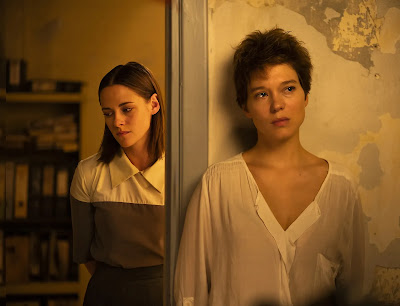Blade Runner
Director ~ Ridley Scott
Writers ~ Hampton Fancher, David Webb Peoples, Philip K. Dick
1982, US-UK
Stars ~Harrison Ford, Rutger Hauer, Sean Young
[This refers to The Director’s Cut.]
A classic, of course, but also surely an influence on all sci-fi that came after, ‘Metropolis’, ‘2001: a space odyssey’ or ‘Star Wars’. And of course, Scott’s own ‘Alien’. Just the opening cityscape – dark, fiery, neon – swooning to Vangelis’ transcendent-ageless 80s synth crescendos and diminuendos is iconic. The retro-futurism neon, cyberpunk, the crammed together population, claustrophobic urbanism – Deckard’s place seems part apartment, part airduct, just one neighbourhood away from Gilliam’s ‘Brazil’ – the seemingly eternal nocturnalism, smog and rain… it’s a timeless mash-up feel of the antiquated and the futuristic. Zeppelins populate the sky along with flying cars – and chortle at the old brand names being advertised in the backdrops, although Coca Cola seems a constant. It feels lived in and plausible: part dazzle, part slum. Douglas Turnbull’s effects are both stunning and immersive. The highest of tech exists alongside entropy, the population distracted by the promise of living off-world.
There’s so much detail to get lost in (a headline about mining on the moon; Deckard climbing over a sofa to cross his over-stuffed apartment) filtered through such a dreamy atmosphere that it takes and rewards multiple viewings to digest. It's marred by the moment where Deckard comes over all let’s teach the lady what she really wants where noirish romance involves a little rough foreplay. It’s an attitude that hasn’t aged well, even when all else still feels timeless; a misstep that glares because so much else is balanced so immaculately. Otherwise, the existential drama hinges on the What Does It Mean To Be Human? that Philip K. Dick’s original specialised in (whilst also cribbing the term “blade runner” from William S. Burroughs). If the question is why would they manufacture android-slaves to be so human-like, even giving them false memories, then surely we can look no further than our tendency to anthropomorphism as much as to Other, or indeed our desire to make AI and CGI as life-like as possible. The question of Deckard’s humanity looms large, but the Why? and What does it mean if he isn’t? gets smothered in the teeming mess and bric-a-brac of this society.
Harrison Ford has that look of a bad boy fearful of being discovered to be decent, an engaging vulnerability. Despite his apparent reputation, it has to be noted that Deckard doesn’t seem a convincing hunter of replicants: he only lives because his prey decides to do something else rather than immediately kill him (except when he shoots from behind). There’s an uncanniness to all the performances, a certain oddness that makes everyone memorable. Of course, it is Rutger Hauer that steals the show, chewing the scenery just with the crawl of his smile and delivering an improvised quintessential monologue… “I’ve seen things…”










